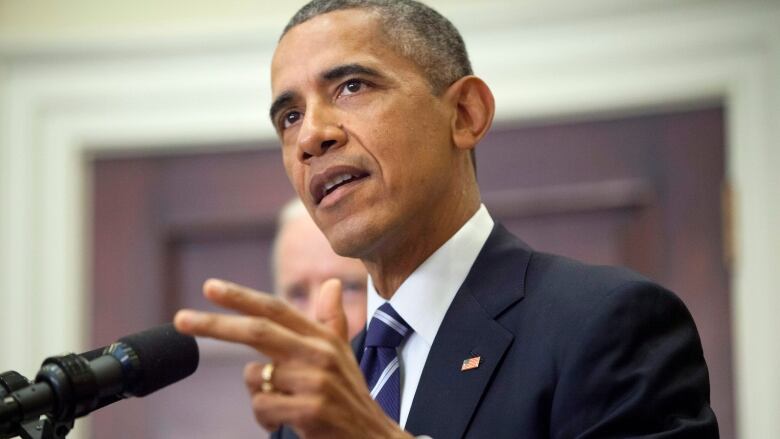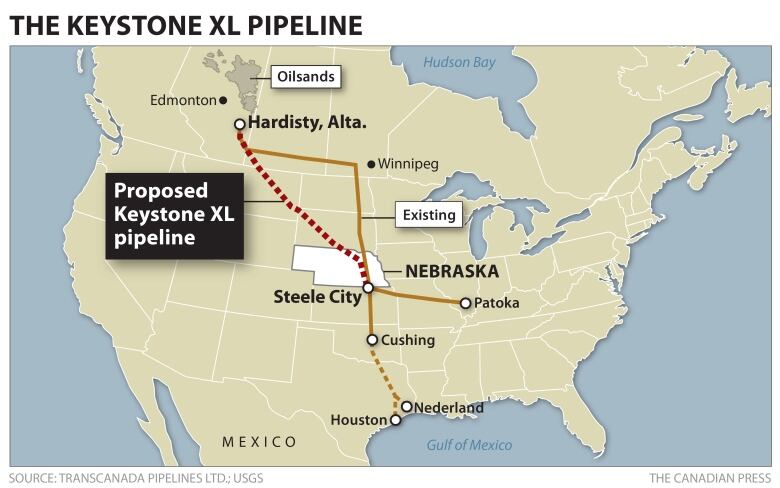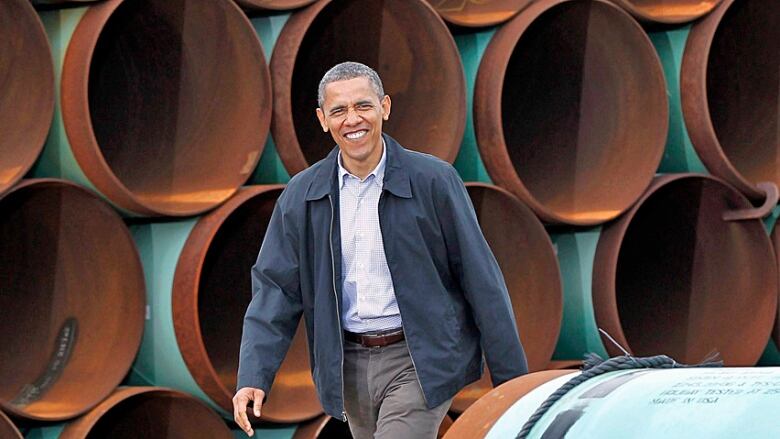Keystone XL rejection leads TransCanada to sue Obama administration
Calgary-based company 'throwing the corporate equivalent of a temper tantrum,' say opponents

TransCanada has filed a lawsuit against the Obama administration and plans to file a claim under the North American Free Trade Agreement over the U.S. government's rejection of the company's proposed Keystone XL pipeline.
- From dull to contentious in 7 years: Will pipelines ever be boring again?
- 5 things to watch as oilpatch hopes for turnaround year
- Oil price to stay below $50 US into 2017, Deloitte says
- Voices for and against Keystone XL speak up as TransCanada announces legal action
The company said Wednesday it has filed a notice of intent to initiate theNAFTAclaim on the basis that the denial wasnotjustified.
"TransCanadahas been unjustly deprived of the value of itsmultibillion-dollarinvestment by the U.S. administration's action," said the company in a release.
The firm says it will be looking to recover $15 billion US in costs and damages as a result of what it says is a breach of obligations under Chapter 11 of NAFTA.
"TransCanadaasserts the U.S. administration's decision to deny a presidential permit for the Keystone XL pipeline was arbitrary and unjustified," the company said.
Obama exceeded his power, says company
TransCanada says it has also filed a lawsuit in the U.S. Federal Court in Texas asserting that President Barack Obama's decision to deny construction of Keystone XLexceeded his power under the U.S. Constitution.

The company says it was a "symbolic gesture"to support the perception that theObamaadministration was taking action on climate change.
The Alberta government issued a short statement on Wednesday evening.
"This is a private sector decision made byTransCanada, one our government will be watching closely.NAFTAhas an established formal arbitration process in place to handle this type of dispute," saidBradHartle, presssecretary to Energy MinisterMargaretMcCuaig-Boyd, in anemail.
"Alberta's trade with the U.S. is critical to our prosperity and we look forward to continuing to collaborate with our U.S. partners to create jobs and grow the economy on both sides of the border."
Obama rejected the proposal in early November, stating it would not serve the national interests of the United States.
He said theU.S. State Department agreed, even though the agencyhad concluded in the past thatthe pipeline would not have "significant impacts to the environment"and would benefit local communities with tax revenue andjobs although mostlyduring theconstruction phase.
The 1,900-kilometre pipeline has been in limbo for more than seven years, and at times has been an irritant in U.S.-Canadian relations.
Corporate 'temper tantrum'
The project, which also became a focal point of environmental protests, would have shipped bitumen from Alberta's oilsands through a pipeline hub in the Hardisty area to U.S. Gulf Coast refineries.

A group of environmental,land and tribalorganizations including the Sierra Club and 350.org issued a statement saying the company was "throwing the corporate equivalent of a temper tantrum" in hopes of "forcing American taxpayers to pay them billions of dollars to recoup their losses."
The group called it an"ill-fated project that they spent seven years trying to bully the U.S. into letting them build."
GreenpeaceCanada agreed, saying the company's arguments do not add up.
"Their legal argument is, since no president before has taken serious action on climate change,Obamashouldn't be allowed to either," Keith Stewart ofGreenpeaceCanada said.
"And that is an argument that is not going to pass muster in the21stcentury."
Legal experts weigh in
Toronto-based lawyer Lawrence Herman said TransCanada could argue the decision to reject the project wasn't made entirely on its merits.

"Their position isthe decision was made on political grounds related to legacy issues, presidential politics, etc. and I think they have a pretty strong case in that regard," he said.
"This could go on for several years before you finally get a decision."
Another legal expert specializing in international trade saidTransCanadahas a strong case to recuperate money it has already spent.
"They could not just wait because if it was approved they would be behind the eight ball, so they had to spend money during the seven-year process,"CyndeeCherniakofLexSagesaid.
"And so what they spent has now basically been tantamount to expropriation."
She also saidthe odds are historically againstTransCanada, as theU.S. has a 100 per centwinning percentage inNAFTAclaims,but there could be a first.
TransCanada saidit had every reason to expect the pipeline would be approved since it met the same criteria as previous pipelines that were sanctioned.
"The denial reflected an unprecedented exercise of presidential power and intruded on Congress's power under the constitution to regulate interstate and international commerce," TransCanada said.
See the lawsuit documents that TransCanada filed here.
See TransCanada's documents showing intent to file aNAFTAchallenge here.
With files from The Canadian Press












_(720p).jpg)


 OFFICIAL HD MUSIC VIDEO.jpg)
.jpg)



























































































